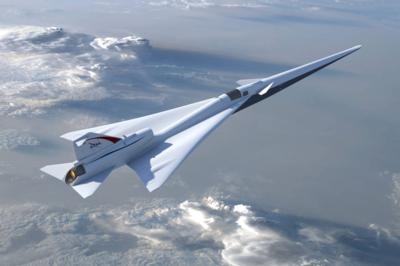Wed, Jun 28, 2017
QueSST Design Can Fulfill LBFD Mission Objectives, Engineers Conclude
NASA has achieved a significant milestone in its effort to make supersonic passenger jet travel over land a real possibility by completing the preliminary design review (PDR) of its Quiet Supersonic Transport or QueSST aircraft design. QueSST is the initial design stage of NASA’s planned Low Boom Flight Demonstration (LBFD) experimental airplane, otherwise known as an X-plane.

Senior experts and engineers from across the agency and the Lockheed Martin Corporation concluded Friday that the QueSST design is capable of fulfilling the LBFD aircraft’s mission objectives, which are to fly at supersonic speeds, but create a soft “thump” instead of the disruptive sonic boom associated with supersonic flight today. The LBFD X-plane will be flown over communities to collect data necessary for regulators to enable supersonic flight over land in the United States and elsewhere in the world.
NASA partnered with lead contractor, Lockheed Martin, in February 2016 for the QueSST preliminary design. Last month, a scale model of the QueSST design completed testing in the 8-by 6-foot supersonic wind tunnel at NASA’s Glenn Research Center in Cleveland.
"Managing a project like this is all about moving from one milestone to the next,” said David Richwine, manager for the preliminary design effort under NASA’s Commercial Supersonic Technology Project. “Our strong partnership with Lockheed Martin helped get us to this point. We’re now one step closer to building an actual X-plane.”
After the success of completing the PDR, NASA’s project team can start the process of soliciting proposals later this year and awarding a contract early next year to build the piloted, single-engine X-plane. The acquisition for the LBFD X-plane contract will be fully open and competitive, with the QueSST preliminary design data being made available to qualified bidders. Flight testing of an LBFD X-plane could begin as early as 2021.
Over the next few months, NASA will work with Lockheed on finalizing the QueSST preliminary design effort. This includes a static inlet performance test and a low-speed wind tunnel test at NASA’s Langley Research Center in Hampton, VA.
(Image provided with NASA news release)
More News
“Achieving PMA for the S-1200 Series magnetos is another step in expanding our commitment to providing the aviation community with the most trusted and durable ‘firewal>[...]
Also: Bell 505 on SAF, NYPA Gets Flak For BizAv 'Abuse', FAA Venezuela Caution, Horizon Update Textron Aviation has confirmed it will be ending production of the Beechcraft Bonanza>[...]
State-Of-The-Art Common Automation Platform To Replace Legacy Systems The FAA has issued a Request for Information (RFI) regarding the initiative of the Trump Administration and U.>[...]
Kunsan Air Base Reported the Accident During Routine Operations The US Air Force has confirmed that it lost an MQ-9 Reaper drone to the South Korean waters on November 24. The airc>[...]
PowerUp S-1200 Series Approved, Available for 4- And 6-Cylinder Engines Hartzell Engine Tech announced it received FAA Parts Manufacturer Approval for its PowerUp S-1200 Series air>[...]
 Aero-News: Quote of the Day (11.27.25)
Aero-News: Quote of the Day (11.27.25) Airborne 11.26.25: Bonanza-Baron Fini, Archer v LA NIMBYs, Gogo Loses$$$
Airborne 11.26.25: Bonanza-Baron Fini, Archer v LA NIMBYs, Gogo Loses$$$ FAA Seeks Info For New Brand-New ATC Platform
FAA Seeks Info For New Brand-New ATC Platform USAF Reaper Drone Crashes Off the South Korean Coast
USAF Reaper Drone Crashes Off the South Korean Coast Hartzell Engine Tech Magneto Gains FAA-PMA
Hartzell Engine Tech Magneto Gains FAA-PMA



